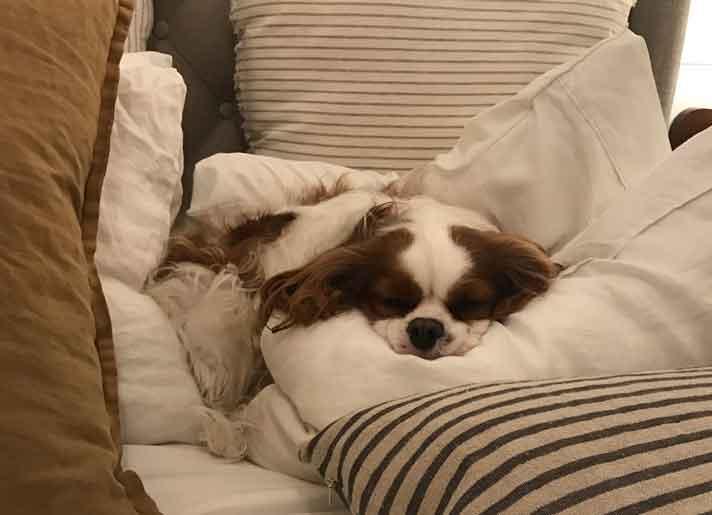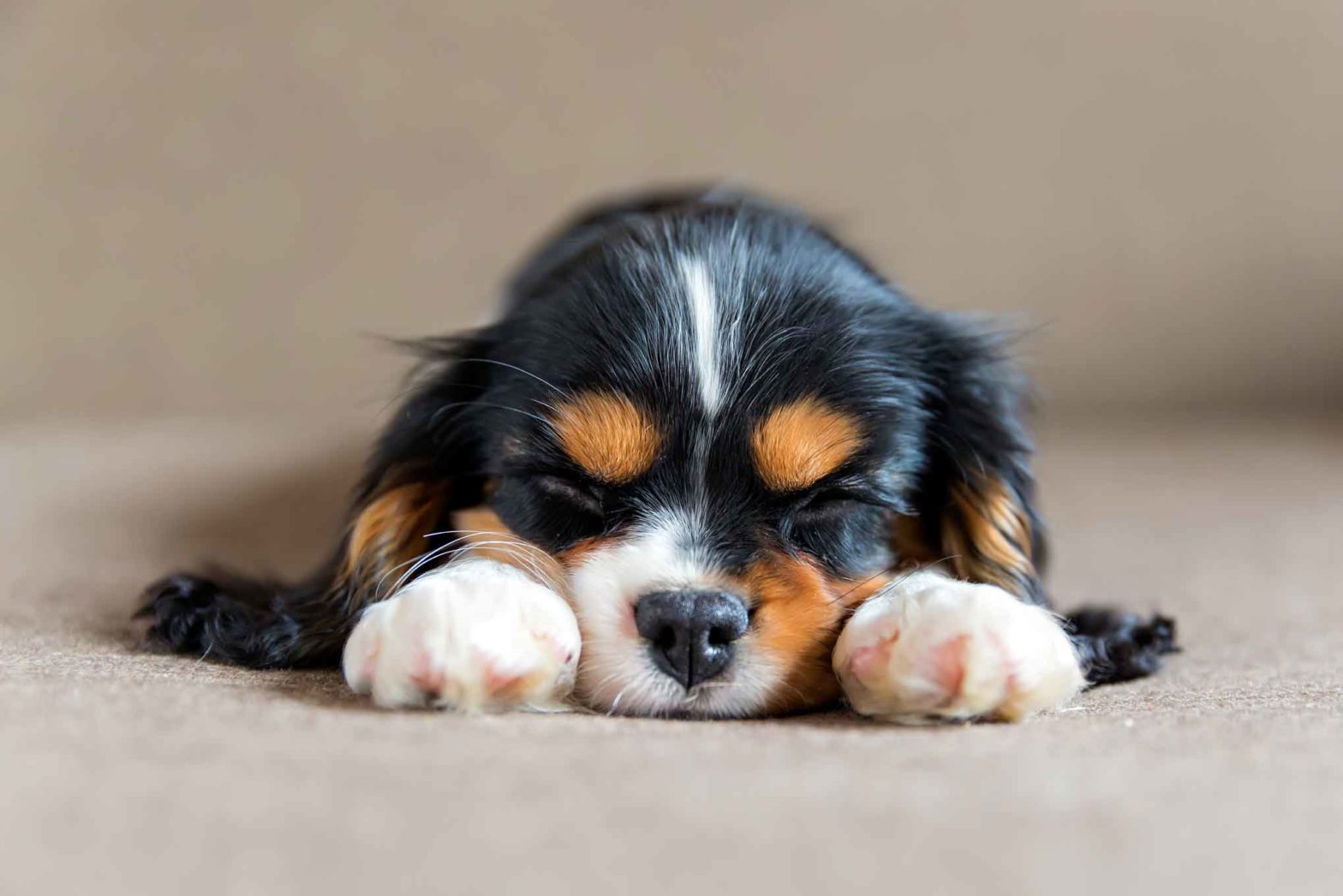Cavaliers are famous for their loud snores. In fact, it’s one of the things that people find adorable about them.
But why do Cavaliers snore?
Cavalier King Charles Spaniels have relatively short snouts and broad skulls. Their long soft palates extend into the dog’s airway, making the passage of air difficult as they breathe. This restriction of airflow causes snoring noises when they breathe in and out.
If your dog snoring doesn’t bother you, or if you actually find it kind of charming, then you won’t mind sharing your bed (or your pillow) with your Cavalier.
Is it Normal for Cavalier King Charles Spaniels to Snore?
Snoring and respiratory issues are quite common in flat-faced breeds like the Cavalier King Charles Spaniel.
The main reason that snoring is so common in Cavaliers is due to the physical anatomy of the airway and palate which obstructs airflow, obstructing normal breathing. This physical condition is known as Brachycephalic Airway Obstructive Syndrome.
What is Brachycephalic Airway Syndrome in Dogs?
Brachycephalic Airway Obstructive Syndrome is the most common cause of snoring and some breathing problems in Cavalier King Charles Spaniels.
The term “brachycephalic” means short-nosed and refers to dogs with short muzzles, noses, and mouths.
Brachycephalic breeds are characterized by their short muzzle, which may be straight (as in pugs) or curved (as in bulldogs). They have broad foreheads, wide-set eyes, and large ears. Their heads are generally wider than they are long.
Although Cavaliers are technically classified as a brachycephalic dog breed, they are only borderline and don’t exhibit many of the negative traits, such as noisy breathing, overheating, excessive snorting, or nostril/sinus issues. However, the physical characteristics of the Cavalier’s nasal passage can increase the likelihood of snoring.
In extreme cases, the medical condition can cause serious breathing difficulties. If your dog is struggling to breathe, a veterinarian may recommend consultation with a surgeon to provide advice on airway surgery.

Are there other reasons why a Cavalier might snore?
Aside from their physical traits, Cavalier King Charles Spaniels can snore for various reasons.
1. Obesity and Poor Diet
Increased weight can cause extra strain on the chest, neck, and back muscles, which can further limit airflow and worsen snoring. Excessive weight is one of the most common causes of snoring.
2. Sleeping Position
The position that your Cavalier sleeps in may affect how loud he snores. When lying on his back, your dog’s head is positioned in such a way that when he breathes, his mouth and tongue vibrate, making a sound. The same as it is with people, a dog sleeping on his side may be less likely to snore than a dog sleeping on his back.
3. Age
As a dog gets older the muscles in the back of their throat tend to weaken causing an increase in the volume of snoring. However, it is also true that other health issues become more likely as a dog increases in age, so it’s important to report an increase in snoring to your vet as it could signal other problems.
4. Allergies
Some dogs who suffer from allergies will experience nasal discharge and sneezing, which can lead to snoring.
5. Medical Conditions
If your dog has any type of medical condition that affects his ability to breathe, it could make him snore. For example, if your dog suffers from asthma, he may find it harder to breathe while asleep, which could result in louder snoring.
6. Dental Problems
Dogs with dental disease often have difficulty chewing and swallowing food, which can contribute to snoring.
7. Lack of Exercise
A sedentary lifestyle can lead to obesity, which can cause snoring. Exercise helps keep your dog fit and healthy, which reduces the likelihood of snoring.
8. Tobacco Smoke
Smoking cigarettes or cigars can irritate the lungs and cause coughing, wheezing, and even snoring.
How to help stop my Cavalier King Charles Spaniel from snoring
There is no sure-fire method for stopping a Cavalier King Charles Spaniel from snoring.
Many of the potential solutions to help your dog to stop snoring also apply to humans, so many options are on the table.
Here are a few suggestions you could try:
1. Adjust the dog’s sleeping position
When your Cavalier is asleep, move her so that her head is facing straight. If your dog insists on sleeping sideways, place a pillow under its head to keep its neck straight. This may improve airflow through the dog’s airway.
2. Use a Pillow
One simple trick that could make all the difference is introducing a pillow to prop up your pet’s head, opening up the airway and preventing noisy breathing and snoring. A pillow can also help to encourage your Cavalier to sleep in a different position, such as on his side or front.
3. Use an Air Purifier
The air in your home can contain many different types of contaminants that can irritate your dog’s airway. Introducing an air purifier can not only improve the chances of your dog getting better sleep by removing pollution from the air, but you might also sleep better too!
4. Use a Humidifier
Depending on the conditions where you live in the world, dry air could be drying out your dog’s sinuses, causing breathing issues as he sleeps. This can cause swelling around the affected area, inducing soreness, making it difficult to breathe, and increasing the likelihood of snoring. Dry sinuses are quite common during the winter months when radiators and other heating devices remove all of the moisture from the air.
5. Excercise Overweight Dogs
Dogs that are overweight have fat buildups around the throat that can restrict airflow and their breathing passage resulting in snoring. Regular exercise in all dogs has many health benefits. Cavaliers can be prone to excess weight, so regular exercise and a sensible diet can go some way to helping.
6. Ask your veterinarian for advice
If you are concerned that your Cavalier may be suffering from other breathing issues resulting in excess snoring, take her to the vet. A vet will be able to assess if your dog is suffering from a brachycephalic condition and advise if they consider surgical correction necessary to this common condition in Cavaliers.
Conclusion
Snoring is common in the Cavalier King Charles Spaniel breed and can usually be treated easily if the dog sleeps comfortably and doesn’t seem to struggle with breathing.
There are many reasons why your Cavalier may be snoring and many possible solutions to help them stop if you want them to.
If your dog seems tired or weak, or if she has difficulty breathing, then you should take her to the vet. An evaluation will help decide what kind of treatment your pet needs.

Leave a Reply